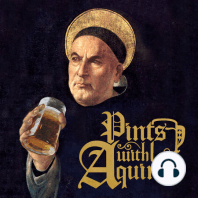28 min listen
BONUS: Are we bound to correct Pope Francis?
ratings:
Length:
52 minutes
Released:
Oct 25, 2019
Format:
Podcast episode
Description
Today I take a look at what Aquinas had to say about correcting our Christian friends (and leaders ... like the Pope and stuff ... {crickets} ...) Please support our work here and get COOL rewards as a thank you! Here's what I read from the ST II-II, Q. 33. Article 1. Whether fraternal correction is an act of charity? On the contrary, To correct the wrongdoer is a spiritual almsdeed. But almsdeeds are works of charity, as stated above (II-II:32:1). Therefore fraternal correction is an act of charity. I answer that, The correction of the wrongdoer is a remedy which should be employed against a man's sin. Now a man's sin may be considered in two ways, first as being harmful to the sinner, secondly as conducing to the harm of others, by hurting or scandalizing them, or by being detrimental to the common good, the justice of which is disturbed by that man's sin. Consequently the correction of a wrongdoer is twofold, one which applies a remedy to the sin considered as an evil of the sinner himself. This is fraternal correction properly so called, which is directed to the amendment of the sinner. Now to do away with anyone's evil is the same as to procure his good: and to procure a person's good is an act of charity, whereby we wish and do our friend well. Consequently fraternal correction also is an act of charity, because thereby we drive out our brother's evil, viz. sin, the removal of which pertains to charity rather than the removal of an external loss, or of a bodily injury, in so much as the contrary good of virtue is more akin to charity than the good of the body or of external things. Therefore fraternal correction is an act of charity rather than the healing of a bodily infirmity, or the relieving of an external bodily need. There is another correction which applies a remedy to the sin of the wrongdoer, considered as hurtful to others, and especially to the common good. This correction is an act of justice, whose concern it is to safeguard the rectitude of justice between one man and another. Article 4. Whether a man is bound to correct his prelate? Objection 1. It would seem that no man is bound to correct his prelate. For it is written (Exodus 19:12): "The beast that shall touch the mount shall be stoned," [Vulgate: 'Everyone that shall touch the mount, dying he shall die.'] and (2 Samuel 6:7) it is related that the Lord struck Oza for touching the ark. Now the mount and the ark signify our prelates. Therefore prelates should not be corrected by their subjects. Objection 2. Further, a gloss on Galatians 2:11, "I withstood him to the face," adds: "as an equal." Therefore, since a subject is not equal to his prelate, he ought not to correct him. Objection 3. Further, Gregory says (Moral. xxiii, 8) that "one ought not to presume to reprove the conduct of holy men, unless one thinks better of oneself." But one ought not to think better of oneself than of one's prelate. Therefore one ought not to correct one's prelate. On the contrary, Augustine says in his Rule: "Show mercy not only to yourselves, but also to him who, being in the higher position among you, is therefore in greater danger." But fraternal correction is a work of mercy. Therefore even prelates ought to be corrected. I answer that, A subject is not competent to administer to his prelate the correction which is an act of justice through the coercive nature of punishment: but the fraternal correction which is an act of charity is within the competency of everyone in respect of any person towards whom he is bound by charity, provided there be something in that person which requires correction. Now an act which proceeds from a habit or power extends to whatever is contained under the object of that power or habit: thus vision extends to all things comprised in the object of sight. Since, however, a virtuous act needs to be moderated by due circumstances, it follows that when a subject corrects his prelate, he ought to do so in a becoming manner, not with impudenc
Released:
Oct 25, 2019
Format:
Podcast episode
Titles in the series (100)
13: Does evil disprove the existence of God?: Objection 1. It seems that God does not exist; because if one of two contraries be infinite, the other would be altogether destroyed. But the word "God" means that He is infinite goodness. If, therefore, God existed, there would be no evil... by Pints With Aquinas
